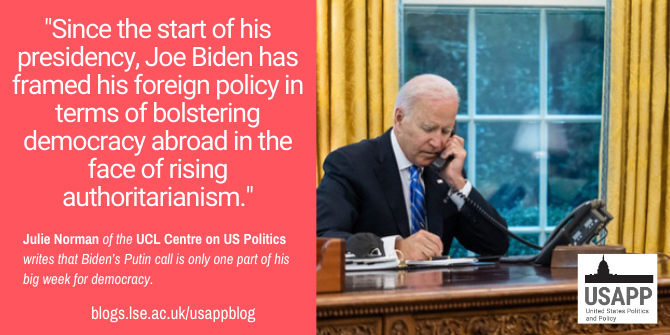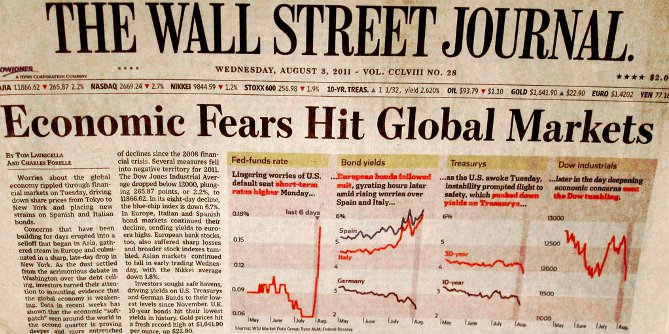 This week President Biden is taking steps to promote democracy abroad, culminating in a two-day global virtual Summit for Democracy. In an overview of Biden’s democracy week, from a call with Russian President Vladimir Putin over Ukraine, a US government boycott of the Beijing Winter Olympics and the summit itself, Julie Norman comments that Biden’s foreign policy activities in this area are underscored by accusations of democratic backsliding at home.
This week President Biden is taking steps to promote democracy abroad, culminating in a two-day global virtual Summit for Democracy. In an overview of Biden’s democracy week, from a call with Russian President Vladimir Putin over Ukraine, a US government boycott of the Beijing Winter Olympics and the summit itself, Julie Norman comments that Biden’s foreign policy activities in this area are underscored by accusations of democratic backsliding at home.
It’s a big week for democracy in Washington. Since the start of his presidency, Joe Biden has framed his foreign policy in terms of bolstering democracy abroad in the face of rising authoritarianism. He brought that messaging to his inaugural address in January, the G7 summit in June, and the United Nations General Assembly in September. This week, Biden has embraced several big agenda items that focus on putting those words into action, including a crucial call with Russian President Vladimir Putin over Ukraine, an announcement of a diplomatic boycott of the 2022 Olympic Games in Beijing, and the launch of a two-day Democracy Summit. What’s at stake with each of these issues, and will they make a difference?
Biden/Putin Redux
Biden’s video call with Putin Tuesday night is important for both clarifying intentions and cooling tensions regarding Ukraine. In a seeming redux of spring 2021, Russia has amassed approximately 100,000 troops on the Ukraine border, and the US fears a possible January invasion, though Russia denies this. The leaders’ face to face meeting in Geneva in June helped calm tensions then, and Biden is hoping Tuesday’s virtual call will do the same. Biden will be looking for a Russian commitment to draw down troops, while Putin will be seeking guarantees that Ukraine will not be admitted to NATO. Biden spoke with European allies on Monday, including the UK, France, Italy, and Germany, and will communicate a united response if Russia continues to escalate, mostly in the form of financial sanctions and banking restrictions; those commitments were key, especially given Europe’s dependence on Russia for crucial gas supplies. With direct military involvement unlikely, Biden and European allies are doubling down on a diplomatic solution, trusting that pragmatic engagement is once again enough to thwart potential Russian aggression.
Tough on China
In another form of assertive diplomacy, the administration on Monday announced a diplomatic boycott of the Beijing Olympics in February, sending a public rebuke to China on human rights issues, namely the targeting of the Uyghur Muslim minority in Xinjiang province and ongoing crackdowns on democracy in Hong Kong. The administration has rare bipartisan support on this issue, with Republicans and Democrats alike calling out China on its human rights record, and it’s likely that other allies may follow suit.
While such gestures rarely change human rights situations on the ground, they do call attention to the abuses and complicate China’s attempts to burnish its global image.
Beijing has accused Washington of ‘politicizing sport,’ but the administration’s own acknowledgement of genocide in Xinjiang makes the human rights issues impossible to ignore.
Democracy Diplomacy
The Olympics boycott decision and the Russia call both come in the days preceding Biden’s global Summit for Democracy, which will take place virtually on Thursday and Friday, convening more than 100 world leaders as well as leaders from civil society and the private sector. The aim of the summit is to discuss issues related to defending against authoritarianism, fighting corruption, and promoting respect for human rights.
The summit has already been subject to some criticism, related to a questionable guest list including countries, such as Poland and Brazil, that hardly seem to qualify (with others left out), and related concerns about dividing the globe into ‘good guys’ and ‘bad guys’, reminiscent of the Cold War. The administration is hoping that the big tent approach will, in the long term, keep states that don’t neatly fit into a democracy/autocracy binary at least somewhat aligned with the interests of the US and its allies. But the immediate challenge for the administration will be to get the summit to move beyond bland statements to chart tangible courses of action.

“P20210802AS-0710” by The White House is United States government work Official White House Photo by Adam Schultz).”
Credibility Gap?
Whether it’s Russia, China, or the summit, Biden’s democracy v. authoritarianism approach to foreign policy has been criticised as having a credibility gap, with many pointing to the seeming backsliding of American democracy in recent years. For example, the US dropped from 94 to 83 (out of 100) over the past decade in Freedom House’s scoring, and a recent Pew Research Center study found that less than 20 percent of people around the world thought US democracy was worth emulating.
National renewal need not be divorced from global engagement however, and indeed, Biden’s foreign policy activities this week are taking place as his signature domestic legislation, the Build Back Better bill, is moving through the Senate with an anticipated vote this month. Further, Biden is right to not discount the leverage the US still has in terms of global agenda setting and leadership. Challenges to American democracy were made starkly visible in the Capitol riot of January 6, but for Biden, that has underscored rather than diminished the urgency to lean into democracy.
Please read our comments policy before commenting.
Note: This article gives the views of the author, and not the position of USAPP– American Politics and Policy, nor of the London School of Economics.
Shortened URL for this post: https://bit.ly/31vJ922
About the author
 Julie Norman – UCL Centre on US Politics
Julie Norman – UCL Centre on US Politics
Julie Norman (@DrJulieNorman2) is a Lecturer in Politics and International Relations at UCL, and Deputy Director of the UCL Centre on US Politics (@CUSP_ucl).





